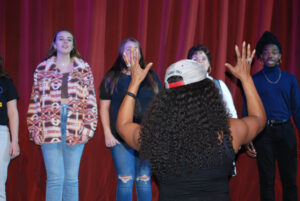Following the COVID-19 pandemic, the Western Carolina University vocal ensemble Catamount “Cat” Singers saw a revitalization with the end of a campus-wide mask mandate and the hiring of Dr. Tiffany Renée Jackson in 2021. As Assistant Voice Professor, Jackson sought to lead this ensemble with a new and improved philosophy: the power of inclusivity.
Jackson discovered her talent for music in the African-American church tradition. She has spent her life and professional career learning from important African-American voices in classical and contemporary music.

“I was all of the sudden given this opportunity,” says Jackson on the responsibility of Cat Singers. “Every professor has a feel for what they want, and I try not to impose. I try to function as a mirror.”
Cat Singers in past years has been devoted to one process: a stoic study of modern artists and their work. This new perspective within the group seeks classical and contemporary students alike. Jackson says she actively looks for music that isn’t difficult to learn while remaining exciting, engaging, and inclusive.
This year, Cat Singers became the first vocal ensemble to perform at the North Carolina Music Educators Association annual conference in Winston-Salem, NC. Members were encouraged to wear t-shirts with famous music artists on them, to display what inspires them as artists. They received a standing ovation for their performance.

Jackson believes in the collaboration between students of different backgrounds. “Part of the way I am helping to diversify this space is to give [young singers] unique opportunities,” she said.
All students involved in Cat Singers come from different forms of musical training, ethnic backgrounds, sexualities, and religious identities. Jackson says that this ensemble only thrives in an environment of inclusion and belonging.
“I wish it were more important,” says Jackson on the diversity among students and faculty at Western Carolina. “If I, as a black woman, can be my authentic self in a space, its going to do one of two things. Its going to encourage others to be more individual, or its going to make people feel uncomfortable, and I am ok with both of those things.”
While she says her message will not resonate with everyone, “especially in this part of the country,” she hopes that with more growth and learning, students attending Western will utilize themselves as a vessel for change.
As the outreach of Cat Singers continues to grow, Jackson has seen students who do not study with her making the effort to come into the space and learn from her.
“If you want young people to be interested in what you’re doing these days, you gotta be interesting,” Jackson said. Students have expressed a willingness to be inclusive within the School of Music and have participated in, a sometimes uncomfortable topic, the discussion of the importance of diversity. These discussions took place within the ensemble and covered topics such as musical appropriation, the importance of black culture in modern music, and how to deliver music that may have an important message.
Members of Cat Singers often share lessons they have learned from their time in the ensemble.
“You don’t have to be perfect to be a good singer,” says Madelyn Walker, a Cat Singers soprano and music education student. “Perfection is hard to achieve if that’s all you’re aiming for.”
Darius McLeod, Cat singer tenor and commercial music student, says “I feel more connected with the people around me. We try to understand the music on a deeper level, and are able to embody the music more freely in this space.”
“We were taught to be present,” says Madison Sciarini, a Cat Singer soprano and commercial music student. “To have the music be impactful, you can’t overthink why you’re there.”
When asked for a statement on the inclusion of diversity in her teaching practice, Jackson smiled, and then asked, “How do you get to perfection if you are afraid to make the noise?”
Here is a glance at a Cat Singers rehearsal for the Western Carolina University 2022 Sounds of the Season showcase.


